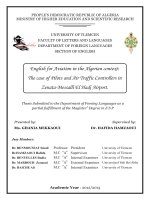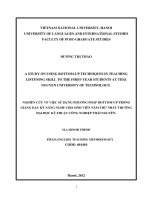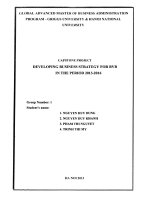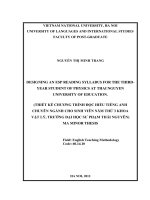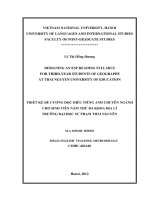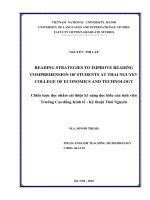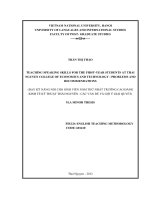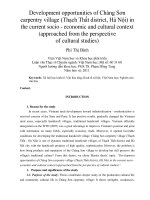Correlates of postering pedagogical competence for teachers in the colleges of economic at thai nguyen province
Bạn đang xem bản rút gọn của tài liệu. Xem và tải ngay bản đầy đủ của tài liệu tại đây (1.04 MB, 109 trang )
CORRELATES OF FOSTERING PEDAGOGICAL COMPETENCE
FOR TEACHERS IN THE COLLEGES OF ECONOMICS
AT THAI NGUYEN PROVINCE
___________________________
A DISSERTATION
Presented to the Faculty of the Graduate School
Southern Luzon State University, Lucban, Quezon, Philippines
in Collaboration with
Thai Nguyen University, Socialist Republic of Vietnam
___________________________
In Partial Fulfillment
of the Requirements for the Degree
Doctor of Philosophy in Educational Management
___________________________
By
NGUYEN THI MINH THU (AUTUMN)
October 2014
i
APPROVAL SHEET
ii
CERTIFICATE OF ORIGINALITY
iii
ACKNOWLEDGMENT
The researcher wishes to convey her gratitude to the following persons who
wholeheartedly devoted and helped make this piece of work a reality:
DR. TERESITA V. DE LA CRUZ, her adviser for the guidance,supervision,
suggestions and precious time in enthusiastically reading and checking the
manuscript, providing the researcher useful materials;
DR. CECILIA N. GASCON, president of the Southern Luzon State University in the
Philippines, for her incomparable contribution and support to the development
of the Doctor of Philosophy in Educational Managementprogram in Thai
Nguyen University;
DR. NGUYEN VAN BINH, director of the International Training Center, Thai Nguyen
University of Socialist Republic of Vietnam, for his enormous pursuit to
provide Vietnamese people an opportunity to grow through education;
DR. WALBERTO A. MACARAAN, DR. APOLONIA A. ESPINOSA, and DR. BELLA
R. MUELLO, panelists, for constructive criticism and valuable comments and
suggestions to improve the study;
The DIRECTORSand TEACHERS of College ofEconomicsandEngineering, Thai
Nguyen Industrial College, Vietnam-Germany Industrial College, Thai Nguyen
College of Economics and Finance, and College ofTradeandTourism for
allowing the conduct of study and active involvement and participation; and
His FAMILY and FRIENDS, for the love and support in one way or another; and to all
who have contributed to make this study a success.
NTMT
iv
DEDICATION
This research is whole-heartedly dedicated to my family and to all my
relatives, my colleagues and friends, and to all classmates, all directors and
teachers of the respondent credit-based schools for giving the researcher the
non-stop guidance and sources of everything.
NTMT
v
TABLE OF CONTENTS
PAGE
TITLE PAGE ………………………………………………………………..
i
APPROVAL SHEET ……………………………………………………….
ii
CERTIFICATE OF ORIGINALITY ………………………………………..
iii
ACKNOWLEDGMENT …………………………………………………..
iv
DEDICATION ………………………………………………………………
v
TABLE OF CONTENTS …………………………………………………..
vi
LIST OF TABLES ………………………………………………………….
viii
LIST OF FIGURES…………………………………………………………
x
LIST OF APPENDICES …………………………………………………...
xi
ABSTRACT …………………………………………………………………
xii
CHAPTER
I
II
III
IV
INTRODUCTION ……………………………………….……
1
Background of the Study ……………………………….…..
2
Objectives of the Study ………………………………….….
4
Significance of the Study …………………………………...
5
Scope and Limitation of the Study …………………….…..
5
Definition of Terms ……………………………………….….
6
REVIEW OF LITERATURE ……………………….……….
9
Conceptual/Theoretical Framework …………………...…..
29
Research Paradigm ……………………………...….………
31
METHODOLOGY ……………………………………………
32
Research Design …………………………….………………
32
Population and Sampling ………………….…...…………..
33
Research Instrumentation………………………...………..
34
Data Gathering Procedure ………………………………….
34
Statistical Treatment …….…………………………………..
35
RESULTS AND DISCUSSIONS ……………………….….
37
vi
Teachers-Respondents’ Profile
37
Teacher’s Pedagogical Competence
44
Correlation between Teachers’ Demographic Profile and
their Pedagogical Competence
Faculty Development Program to Foster Pedagogical
Competence
Acceptability of the Proposed Faculty Development
Program
Pedagogy and Performance: A Proposed Faculty
Development Program
V
51
58
60
65
SUMMARY OFFINDINGS, CONCLUSIONS AND
RECOMMENDATIONS
Summary…………………….…………………………….…
76
Findings ………………………………………………………
77
Conclusions ……………………………………………….…
79
Recommendations ……………………………………..……
80
REFERENCES ……………………………………………………………..
81
APPENDICES ……………………………………………………………...
83
CURRICULUM VITAE …………………………………………………….
93
vii
LIST OF TABLES
TABLE
PAGE
1
Frequency Distribution of the Respondents by College ……..
33
2
Frequency and Percentage Distribution of Respondents in
terms of Gender………………………………………………….
37
Frequency and Percentage Distribution of Respondents
in terms of Civil Status…………………………………………..
38
Frequency and Percentage Distribution of Respondents
in terms of Age…………………………………………………...
39
Frequency and Percentage Distribution of Respondents
In terms of Length of Teaching Service……………………….
40
Frequency and Percentage Distribution of Respondents
In terms of Educational Attainment …………………………….
41
Frequency and Percentage Distribution of Respondents
In terms of Seminars/ Training Attended……………………...
42
Frequency and Percentage Distribution of Respondents
In terms of Teachers' Performance Rating ……………………
43
Frequency and Mean Distribution of the Teachers’
Pedagogical Competence in terms of Preparation for
Teaching………………………………………………………….
44
Frequency and Mean Distribution of the Teachers’
Pedagogical Competence in terms of Classroom
Management ……………………………………………………..
46
Frequency and Mean Distribution of the Teachers’
Pedagogical Competence in terms of Lesson Presentation..
47
Frequency and Mean Distribution of the Teachers’
Pedagogical Competence in terms of Assessment………….
50
Correlation between Teachers’ Age and their Pedagogical
Competence ……………………………………………………...
51
Correlation between Teachers’ Gender and their
Pedagogical Competence ………………………………………
52
Correlation between Teachers’ Civil Status and their
Pedagogical Competence ………………………………………
53
3
4
5
6
7
8
9
10
11
12
13
14
15
viii
TABLE
16
17
18
19
20
21
22
PAGE
Correlation between Teachers’ Educational Attainment
and their Pedagogical Competence …………………………...
54
Correlation between Teachers’ Length of Service and their
Pedagogical Competence ………………………………………
55
Correlation between Teachers’ Seminars/Trainings Attended
and their Pedagogical Competence …………………………...
56
Correlation between Teachers’ Teachers’ Performance
Ratingand their Pedagogical Competence…………………..
57
Frequency and Weighted Mean Distribution on the
Acceptability of the Proposed Faculty Development Program
as to Contents ……………………………………………………
60
Frequency and Weighted Mean Distribution on the
Acceptability of Proposed Faculty Development Program as
to Strategies ………………………………………………………
61
Frequency and Weighted Mean Distribution on the
Acceptability of the Proposed Faculty Development Program
as to Economy ……………………………………………………
63
ix
LIST OF FIGURE
FIGURE
1
PAGE
Schematic Diagram of Independent and Dependent
Variables on the Correlates of Teachers’ Pedagogical
Competence ……………………………………………………..
x
31
LIST OF APPENDICES
APPENDIX
PAGE
A
Communications ………………………………….
84
B
Instrument
88
xi
ABSTRACT
Title of Research
: CORRELATES OF FOSTERING PEDAGOGICAL
COMPETENCE FOR TEACHERS IN COLLEGES
OF ECONOMICS AT THAI NGUYEN PROVINCE
Researcher
: NGUYEN THI MINH THU (AUTUMN)
Degree Conferred
: DOCTOR OF PHILOSOPHY IN EDUCATIONAL
MANAGEMENT
Name and Address
of Institution
: Southern Luzon State University Lucban, Quezon,
Philippines and Thai Nguyen University, Socialist
Republic of Vietnam
Adviser
: Dr. Teresita V. de la Cruz
Year Written
: 2014
______________________________________________________________
The goal of this study was to find out the correlates of pedagogical
competency of the teachers-respondents in Colleges of Economics at Thai Nguyen
Province.It utilized survey questionnaires as the main data gathering instrument. This
study used the descriptive correlational method of the study to determine the
significant relationship between respondents’ profile and their pedagogical
competency.
The
survey
on
teachers’
demographic
profile
waspresented
throughfrequency and percentage; pedagogical competency of the respondents
using weighted mean; and the relationships of the two variables through Pearson r.
The results of the data analyzed were used as basis for proposing the faculty
development program. It was then found out that most of the teachers are females,
married, relatively young, novice in the service, has baccalaureate degree and a
considerable number of trainings and seminars, and are average in terms of
performance rating. Teachers are pedagogically competent in terms of preparation
for teaching (2.88), classroom management (2.70), lesson presentation (2.83), and
assessment of students (2.81). Age, civil status, length of service and the
performance rating mostly influence the teacher’s pedagogical competence while
xii
educational attainment and gender determine it to a little extent. The proposed
faculty development program is highly acceptableas to contents (3.33), strategies
(3.36), and economy (3.26), and therefore is ready for adoption. However, it was
recommended that the faculty development program might be enhanced to further
suit the needs of the teachers with the same pedagogical needs.
xiii
1
Chapter I
INTRODUCTION
Pedagogical competence has been regarded either as an ensemble of
potential behavior/ capacity allowing for efficient manifestation of an activity,
or as the minimum professional standard, often specified by law, in whichthe
professionals should reach. Thus, the first statement takes into consideration
the resources used in the educational process starting from and based on
developing the competence. Thisapproach regards pedagogical competence
as “the ability of an individual to use coordinated, synergistic combination of
the tangible resources (e.g. instruction materials such as books, articles, and
cases and technology like software and hardware) and intangible resources
(e.g. knowledge, skills, experience, attitudes) to achieve the efficiency and
effectiveness in pedagogy” (Madhavaram, 2010).
The pedagogical competence in general consists of the preparation for
teaching, lesson presentation, classroom management, and an assessment of
students’ performance. Shrestha (2008) asserted that the competent teacher
needs not only content mastery but alsopedagogical competency. Content
mastery provides knowledge about what to present in the classroom whereas
the pedagogical competency provides the knowledge as well as skills in how
to present the content. Nguyen Thị My Loc (2003) cited that pedagogy is the
art of teaching bringing effectiveness in teaching-learning. Effective pedagogy
promotes achievement of students and builds up the confidence of teachers in
teaching. It contributes in bringing quality of learning and teaching in class).
2
The teachers need to be good at professional knowledge which means
thatteachersmust have adeep knowledgeoftheir subjects, alwaysupdate
andaddnew knowledgeto refineandimprovetheir knowledge.According to
Srutirupa(2012),
teachersmust
develop
as
well
pedagogicalcompetenceto determinethe quality of
as
enhance
their
their teaching and
professional skills.Pedagogical competence is important in determining the
efficiency of creative labor process of teaching. Enhancing the teachers’
pedagogical competence is consideredan innovativesolutiontoimprove the
quality
ofhumanresourcetraining
(Ryegard,Orisson,Apelgren,&Eriksson,
2010).
Pedagogical competence is described by Giertz (2003) as the ability
and the will to regularly apply the attitude, knowledge and skills that promote
the learning of the students. It shall take place in accordance with the goals
that are being aimed at and the existing framework and presupposes
continuous development of the teacher’s own competence and course design.
Background of the Study
MostoftheteachersintheCollegesofEconomicsgraduatedfromtheUniversit
yofEconomics. In Vietnam, the universities and colleges do not train
pedagogical competence for students (except for pedagogical universities and
colleges).
Before
they
become
teachers,
they
participate
in
the
standardizedpedagogical competence course, but time is not enough for them
to enhance their pedagogical competence.
Thus,
teachershaveanumber
of
limitationsin
terms
ofdeveloping
theirpedagogical competence.Someteachers are not that interested in
3
innovating their teaching methods and presentation method so they still follow
‘teachers present-students-write-notes scheme. Teachers sometimes only
take charge of the teaching knowledge to students without instructing
students’ methods of self-learning and self-study. Their ability to prepare their
daily lesson plans still needs polishing for it to promotestudents’ creativity and
activeness. Added to these are the difficulties in the art of questioning,
inability
to
communicatewell
withthe
students,
handlingdisciplinary
problemsand the likes. The teachers’ applicationofcomputer and information
technology still needs enhancement. As observed by the researcher, teachers
seldom incorporate the educational technology in classroom instruction
making the class interaction boring.
It is also a challenge among teachers whentheyevaluatethe classroom
activities and individual performance of the students. They are likely to focus
more in the traditional assessment and not so much on exploring individual
capabilities of their students in engaging in other activities that do not entail a
paper-and-pencil test. The diversity of the teaching methods employed are not
consistently evident in every classroom because what prevails is more of the
question-and-answer method.
Aware of the aforementioned dilemmas, the researcher was prompted
to determine the correlates of the teachers’ pedagogical competence in the
Colleges of Economics at Thai Nguyen Province with an endview of proposing
faculty development programtoimprovepedagogical competence of teachers
andmeettherequirementsofthe
education inparticular.
nationaleducation
ingeneraland
higher
4
Objectives of the Study
This study aimed to find out the correlates of pedagogical competence
in Colleges of Economics as basis forproposingfaculty development program
at Thai Nguyen Province for the school year 2013-2014.
Specifically, it sought answer to the following objectives:
1. Determine the profile of the teachers in terms of;
1.1 Gender,
1.2 Civil status,
1.3 Age,
1.4 Length of service,
1.5 Educational attainment,
1.6 Seminars/ trainings attended, and
1.7 Teachers’ performance rating.
2. Find out the pedagogical competence of teachers in terms of:
2.1 Preparation for teaching,
2.2 Classroom management,
2.3 Lesson presentation, and
2.4 Assessment of students.
3. Ascertain if there is a significant relationship between the teachers’
profile and their pedagogical competence.
4. Develop a faculty development programto foster pedagogical
competence of teachers.
5. Find out the level of acceptability of the faculty development program
as to:
5
5.1 Contents,
5.2 Strategies, and
5.3 Economy.
Significance of the Study
This study would be beneficial to the teachers, students, administrators
and future researchers in the following respect:
Teachers. The outcome of the study is of great help to the teachers in
the Colleges of Economics where most teachers have insufficient trainings in
advancing their pedagogical skills.Faculty development program would
serveto enhance their pedagogical competencies in the teaching-learning
process.
Students. They would be benefited in this research since they are the
main concerns of educators. The teachers with high pedagogical competence
could give more direct impactonthe quality of teaching they deliver among
students thereby making the classroom environment inviting and interesting
for them to focus more in the classroom activities.
Administrators. It is hoped that the study may contribute in giving a
new dimension in administration and supervision of Colleges of Economics.
The study would provide administrators insights on how they can manage
thepedagogical competence of teachers effectively and successfully.
Future Researchers. This research could provide references for future
proponents who wish to venture a study similar to the nature of this ongoing
research. Moreover, they could use the information and results of the study to
substantiate their parallel and future researches.
Scope and Limitation of the Study
6
This study focused on thepedagogical competence of teachers in the
Colleges of Economics at the Thai Nguyen Provincefor the school year 20132014. It was limited to 136teachers who were held respondents in this study.
Survey of the teachers’ demographic profile and measurement of their
pedagogical
competence
werelimited
to
the
use
of
checklist
questionnaires.Theteachers’ personal profiles such as gender, civil status,
age, length of service, educational attainment and teaching performance
rating were used to correlate with pedagogical competence on areas of
preparation of teaching, classroom management, lesson presentation, and
assessment of students.
The time frame of this study was from August 2013 to February 2014.
Definition of Terms
For clarity and better understanding of the study, the following terms
are defined both conceptually and operationally.
Age is a period of human life, measured by years from birth (http://dictionary.
reference.com/browse/age). In the context of this study, it refersto one
of the demographic profile correlates to pedagogical competence.
Assessment of Studentsis operationally defined as teacher’spedagogical
competency in evaluating students’ classroom performances and ability
to utilize different forms of assessment techniques.
Civil status is the term used mostly by government organizations to show a
person’s status as a citizen (Retrieved from erence.
com/browse/). In this research, it is one of the correlates to teachers’
pedagogical competence.
7
Classroom management is defined as the actions teachers take to create an
environment that supports and facilitates both the academic and socialemotional learning (Evertson &Weinstein, 2006). It refers to one of the
measures of pedagogical competence.
Educational attainmentrefers tothe level of education completed in terms of
highest degree or the highest level of schooling completed (US Census
Bureau Glossary, 2006).In this research, it is one of the correlatesto
pedagogical competence.
Faculty Development Programis a broad term describing any of the various
activities carried out by faculty members for personal and professional
enrichment (Marywood University Faculty Development, 2012).In this
study, itrefers to a program of activities for teachers to improve their
pedagogical competence especially in their weak areas.
Gender refers to the respondent’s identity as to male or female. In this study,
it is one of the correlatesto pedagogical competence.
Length of Service is operationally defined as the actual number of years the
teacher has served in Colleges of Economics in Thai Nguyen Province.
Lesson Presentation is defined in this study as the pedagogical competency
of the teachers which includes their ability to employ different teaching
styles and methods to carry out the lessons.
Pedagogicalcompetencerefers to the ability of an individual teacher to use
coordinated, synergistic combination of tangible resources (instruction
materials such as books, articles, and cases and technology such as
software
and
hardware
andintangibleresources
such
as
knowledge,skills, experience to attain the pedagogical efficiency and
effectiveness (Madhavaram, 2010). In this study, it encompasses the
8
preparation for teaching, classroom management, presentation of
lesson, and student performance assessment.
Preparation for teaching is used in this study as one of the measures of the
pedagogical competence of the respondents. It includes teacher plans
for teaching,goals/objectives, instructional materials, strategy/method,
and assessment to be used.
Seminars/ Trainings Attended refer to the conferences, lecture courses, or
other meetings for discussion/training related to teacher’s professional
advancement. It is one of the correlates to pedagogical competence.
Teachers’ Performance Rating refers totherating given by the immediate
head at the end of school year/semester for the teaching performance
based from the college/school sets of indicators.
9
Chapter II
REVIEW OF LITERATURE
This chapter presents the relevant readings and related literature which
bear significance and similarities in this study. This also includes conceptual
framework and research paradigm that guide the conduct of the study.
Pedagogical Competence
Pedagogical competence is “the ability of individual to use coordinated,
synergistic combination of tangible resources (e.g. instruction materials such
as books, articles, and cases and technology such as software and hardware)
and intangible resources (e.g. knowledge, skills, and experience) to achieve
efficiency and/ or effectiveness in pedagogy” (Madhavaram & Laverie, 2010).
Ryegard, Orisson, Apelgren and Eriksson (2010) described pedagogical
competenceastheabilityandwilltoregularlyapplythe
attitude,knowledgeandskillsthatpromotethelearningofthestudents.Thisshalltake
placeinaccordancewiththegoalsthatarebeingaimedatandtheexistingframeworka
ndpresupposescontinuousdevelopmentofthe teacher’s own competence and
course design.
The concept of pedagogical competence also tends to be used with the
meaning ofthe minimum professional standard, often specified by the law,
which should raise a person in fulfilling particular role of teaching profession
(Gliga, 2002). According to Diaconu and Jinga (2004), the level at which the
pedagogical competence is analyzed special attention isgiven to the results
obtained in any educational process developed through the perspective of
10
competence thus stressing on the performance to which variousmethodical
algorithms for achieving teaching tasks are selected, combined and put into
effect depending on changes of situational context in which the educational
activities are realized with students.
Giertz
(2003)
stated
that
pedagogicalcompetencecanbedescribedastheabilityandtwilltoregularlyapplyat
titude,knowledgeandskillsthatpromotethelearningofteacher’sstudents.Thisshal
ltakeplaceaccordingto
goalsthatarebeingaimedatandexistingframeworkandpresupposescontinuousd
evelopmentofteacher’sowncompetenceandcoursedesign.”
Pedagogicalcompetenceimpliesthattheteacherfromdefinitegoalsandfra
meworks,throughcontinuousdevelopmentofteachingandpersonalprofessionald
evelopment,supportsandfacilitatesthelearningofstudentsinthebestway.Thispe
dagogicalcompetencealsoreflectstheteacher’scompetenceregarding
collaboration,comprehensiveviewandcontributiontothedevelopmentofpedago
gyforhighereducation”(Ryegård,2008).
Knowledgeandmethodaretwocomponents
pedagogicalcompetence.
Knowledgeis
not
to
create
onlythe
professional
knowledge(narrow) but alsopedagogical knowledgesuch aspsychology,
education, sociology, logic, artandthe personalexperience. However, having
only the knowledgeis not enough, if teachers want to have pedagogical
competence, they should have educational methods, goodteachingmethods.
Goodmethodis a methodin accordance withthe objectandhaving high
efficiency.
Ryegard et al. (2010) found out that three things are required in order
11
to be able to assess a teacher’s pedagogical competence: A definition of the
pedagogical competence, so that what is being assessed is clearly evident;
Known assessment criteria that are connected to the definition; a teaching
portfolio, where the teacher documents and substantiates pedagogical skill
based on the requirements for the job.
Fromthe
requirements
above,
theyprovidecriteriafor
evaluatingthepedagogical competenceas follows: an attitude that promotes
learning based on research and a scholarly attitude; Broad and current
knowledge of subject; Knowledge about how students learn; knowledge about
teaching; Awareness of goals and frameworks; Holistic view; Teaching skill;
Striving for continuous improvement; Leadership and organizational ability;
Collaboration with others and external contacts.
Education Development Strategy2011-2020set outgeneral objectives:
“By
year
2020,
the
country'seducationisfundamentallyand
comprehensivelyreformedinthe directionofthe standardization, modernization,
socialization, democratizationandinternational integration; quality of education
is enhanced comprehensively, including: moral education, practicalability,
creativeability,
life
skills,
competenceinforeignlanguages
andinformationtechnology; meet humanneeds, especially high-quality human
resourceforindustrializationand
modernizationof
the
countryand
buildingtheintellectualeconomy.”
Nguyen Duc Tri (2001) maintained that teaching isthe main
activityofthe school. Ittakesplaceinacertain processcalledteaching process.
This
is
a
socialprocessin
which
studentsthemselvescontrolandadjusttheirperceptionpositively
the
12
andactivelyunder adjustment,directionandguidance ofteacherstoimplementthe
purpose – the task ofteaching. Clearing teachers’ operating model will provide
basis for the process of determining the required training content, to inherit
and develop availableknowledge, skills of teachers, and supplement and
expand
their
knowledge.
The
teacher's
activitiesareso
multiform,
butingeneralhave five(5) basiccontents which are a) teaching; b) educating
students;
c)
self-education;d)
researching
and
applying
the
scienceandtechnology to innovateteaching; and e) social activities.
According
toDaulandKauchak(2000),
to
be
able
toconducteffectiveteaching, teachersmust beable to organizeclasses, ensure
that thelearning activities aresuitable forthe learning objectives, ensure the
feedback, monitorstudents wellduringclasses, know to summarize at the time
needed,
have
the
capacityto
ask
questions,
havethe
proper
attitudeandskillsfor using words.
NguyenHuuDung (2005)stated thattodetermine thepropermethodof
trainingandfosteringteachers, diagnostic competence should be basedon
competence in responding, competence in the assessment, competence for
the
establishedfavorablerelationshipswithothers,
especially
withstudents,
competence in implementingthe curriculumandeducation, competence for
combining thesocial forcesinthe implementation ofeducational goals.
Speaking ofteachingcompetence, Tran BaHoang(2008) mentioned that
teachingskillsis
ofmanipulation
the
of
a
ability
toperformsomemanipulationoraseries
teachingactionby
waysandproceduresreasonably.
selecting,
applyingknowledge,
Everystageofthe
processhasthegroups of teachingskillsrespectively.
teaching

